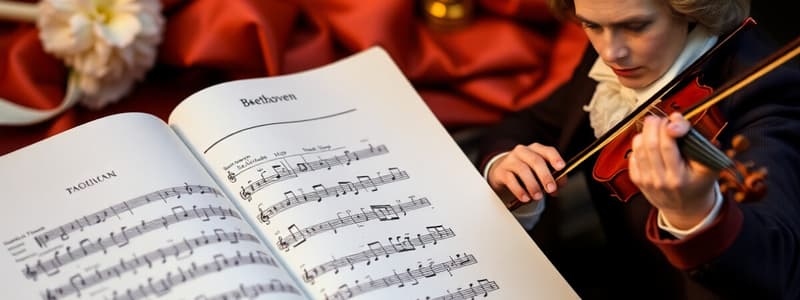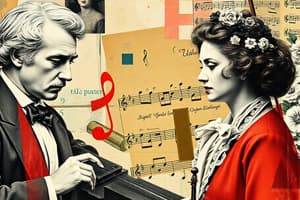Podcast
Questions and Answers
What is the approximate time period for the Romantic Era in music?
What is the approximate time period for the Romantic Era in music?
- 1650-1750
- 1750-1820
- 1820-1910 (correct)
- 1910-2000
What is one musical characteristic associated with the Romantic Era?
What is one musical characteristic associated with the Romantic Era?
- Primarily instrumental music
- Expression of individual emotion (correct)
- Focus on intricate counterpoint
- Emphasis on strict adherence to form
How did the influence of nationalism manifest in Romantic Era music?
How did the influence of nationalism manifest in Romantic Era music?
- Composers incorporated folk songs and styles from their native countries (correct)
- Music became strictly religious and spiritual in nature
- Composers adopted a single, universal musical style
- Music focused solely on classical themes and traditions
Who is considered the "Poet of the Piano"?
Who is considered the "Poet of the Piano"?
Which of these compositions is NOT attributed to Niccolo Paganini?
Which of these compositions is NOT attributed to Niccolo Paganini?
Which of the following is NOT a musical form or style associated with Chopin?
Which of the following is NOT a musical form or style associated with Chopin?
What is a mazurka?
What is a mazurka?
Which of these composers is known for their "Hungarian Rhapsodies"?
Which of these composers is known for their "Hungarian Rhapsodies"?
What is the main characteristic of a nocturne?
What is the main characteristic of a nocturne?
Which of the following is NOT a characteristic of a sonata?
Which of the following is NOT a characteristic of a sonata?
Flashcards
Romantic Period
Romantic Period
Cultural movement (1820-1910) emphasizing emotion and individualism in art and music.
Nationalism in music
Nationalism in music
Incorporating native folk songs and styles to reflect national identity.
Ludwig Van Beethoven
Ludwig Van Beethoven
Composer bridging Classical and Romantic eras, known for emotional depth in music.
Niccolo Paganini
Niccolo Paganini
Signup and view all the flashcards
Frederic Chopin
Frederic Chopin
Signup and view all the flashcards
Chopin's Ballade
Chopin's Ballade
Signup and view all the flashcards
Mazurka
Mazurka
Signup and view all the flashcards
Nocturne
Nocturne
Signup and view all the flashcards
Franz Liszt
Franz Liszt
Signup and view all the flashcards
Robert Schumann
Robert Schumann
Signup and view all the flashcards
Study Notes
Romantic Period Music
- The Romantic period (1820-1910) was a cultural movement emphasizing emotion, imagination, individualism, and freedom of expression. These characteristics were evident in music, art, and literature.
- Nationalism was a significant element, incorporated into music from this era.
- Ludwig van Beethoven's expressive passionate music bridged the Classical and Romantic eras.
- Other composers were influenced by Beethoven’s style, adopting music as a means of expressing individual emotions.
- Most Romantic era musical compositions reflected the spirit of the time.
Nationalism in Romantic Music
- Composers often incorporated their country's native folk songs and musical styles into their compositions.
- They employed materials from their nation's history to highlight their culture.
Famous Violin & String Composer
- Niccolò Paganini (born 1782 in Genoa, Italy) was a highly influential Italian composer and virtuoso violinist.
- He started playing the mandolin at age five, transitioning to the violin at seven.
- He became a renowned violin virtuoso.
- His compositions significantly inspired other composers such as Franz Liszt, Frédéric Chopin, and Robert Schumann.
- Some of his well-known works include "La Campanella," 24 Caprices for solo violin, Concerto no. 1 in Eb, Op. 6, 15 Quartets for Guitar and Strings Trio, and "The Carnival of Venice."
Famous Piano Composers
- Frédéric Chopin (born 1810 in Żelazowa Wola, Poland) was known as the "Poet of the Piano."
- His music was characterized by beautiful tone, rhythmic flexibility, and elegance.
- Compositions like mazurkas and polonaises expressed his love for Poland.
Chopin's Works
- Notable compositions include:
- Ballades
- Etudes
- Mazurkas
- Nocturnes
- Polonaises
- Preludes
- Waltzes
- Impromptus
- Scherzos
- Sonatas
Franz Liszt
- Franz Liszt, a Hungarian composer and virtuoso pianist, was a prominent figure in the Romantic period.
- As a prolific pianist, he was active throughout Europe playing and studying in Vienna and Paris.
- He gave concerts throughout Europe.
- He's recognized as a generous composer for sharing his time and resources with orphans and victims of calamities and free music instruction to children.
- His piano works, which included arrangements of other composers' works, were influential, and were crucial to orchestral development and popular musical forms. Some popular works include the famous "La Campanella," "Liebestraume no. 3," and "Hungarian Rhapsodies."
Robert Schumann
- Robert Schumann (born 1810 in Zwickau, Germany) was a German composer considered an heir of Beethoven and Schubert creative traditions.
- He was a composer and music critic.
- In 1834, he established the "Neue Zeitschrift für Musik" (New Journal for Music) where he contributed music criticism.
Schumann's Works
- Schumann composed various works, including piano pieces, orchestral music, and vocal music.
- Major works include:
- Abegg Variations
- Davidsbündlertänze
- Carnaval
- Fantasiestücke
- Kreisleriana
- Kinderszenen
- Piano Concerto in A minor
- Orchestral music such as Operture, Scherzo, Finale
Studying That Suits You
Use AI to generate personalized quizzes and flashcards to suit your learning preferences.




